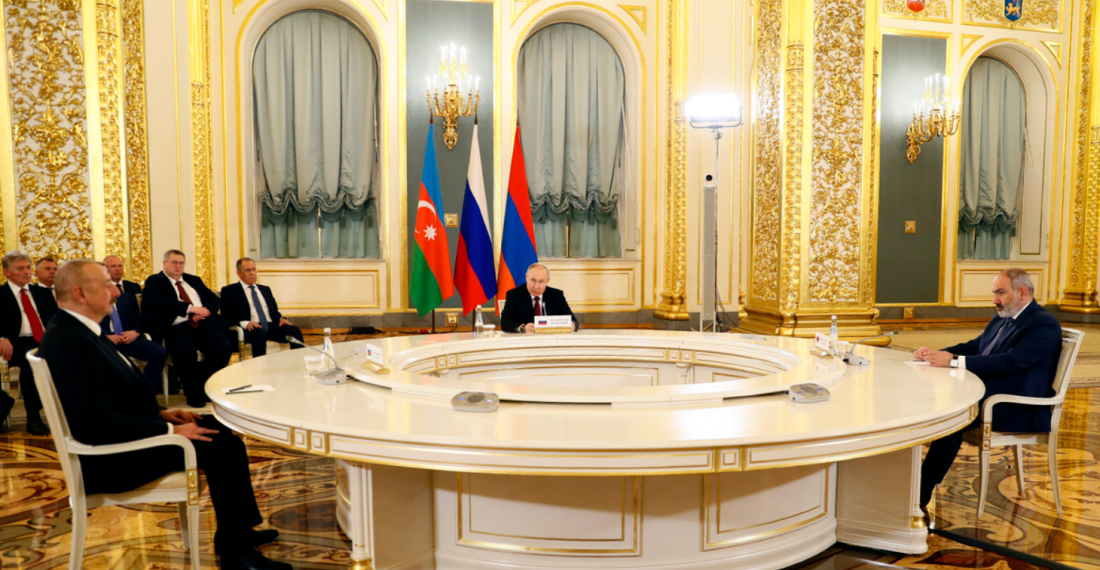We might again have returned to a game of Russia trying to derail the Armenia-Azerbaijan peace process after progress is made in Western-mediated negotiations, writes Vasif Huseynov in this op-ed for commonspace.eu. "The Moscow summit on 25 May, in a similar vein to the Sochi summit of last year, was an attempt by the Russian side to ensure its mediating role between the two Caucasian republics as well as to make sure that no treaty was going to be signed without consideration of Russia’s regional interests," he writes.
On 25 May, Russia managed to bring the leaders of Armenia and Azerbaijan, Prime Minister Nikol Pashinyan and President Ilham Aliyev, respectively, together for a trilateral meeting with President Vladimir Putin on the sidelines of the Eurasian Economic Union summit in Moscow.
This meeting came on the heels of the increased dynamics in the peace talks between the two South Caucasian republics mediated by the European Union (EU) and the United States of America (USA). In the aftermath of the marathon talks between the foreign ministers in Washington in early May, the political leaders of the two countries met in Brussels on 14 May, reactivating the EU-mediated trilateral meetings.
Armenian and Azerbaijani leaders had earlier this year met in another meeting mediated by the United States Secretary of State Antony Blinken on the sidelines of the Munich Security Conference in February. It has been widely reported by both the officials of the Caucasian republics and the Western mediators that the two countries were close to a final peace deal. The latest Brussels summit (14 May), in particular, appeared to be a precursor to a peace summit as the Armenian leader unequivocally and verbally recognized the Karabakh region as part of Azerbaijan.
These dynamics in the peace process were reminiscent of the developments between Baku and Yerevan in the last quarter of 2022. In a similar way, but less clearly, to the outcomes of the Brussels summit (May 14), Armenia and Azerbaijan had recognized each other’s territorial integrity in their Prague summit mediated by President Charles Michel of the European Union Council and President Emmanuel Macron of France on 6 October 2022. Optimism was again high in the region following this summit. Both Baku and Yerevan officials expressed their anticipation for the signing of a comprehensive peace treaty by the end of 2022.
Russia is displeased with Western-mediated peace talks and initiatives between Yerevan and Baku
Amidst this optimism, the Russian leader convened the next trilateral summit with his counterparts from Armenia and Azerbaijan. Organized for the first time since the last Moscow-mediated summit on 26 November 2021, the trilateral summit on 31 October 2022 in Sochi fell short of bringing about any major breakthrough in the negotiations. Most significantly, the leaders of Armenia and Azerbaijan reaffirmed their agreement reached earlier in the Prague summit about mutual recognition of each other’s territorial integrity, this time in the presence of President Putin. The Sochi meeting was largely seen in the region as Russia’s attempt to make sure that the two countries would not sign any major document that would be against Moscow’s regional interests.
Indeed, a couple of days before this summit, at a meeting of the Valdai Discussion Club, Russian President Vladimir Putin did not conceal his displeasure with the Western-mediated peace talks and initiatives between Yerevan and Baku. Describing the peace treaty draft discussed in the Western-mediated track of negotiations as the “Washington version,” he said, “as far as I understand, [this version] envisages the recognition of the sovereignty of Azerbaijan over Karabakh in general”. This settlement model appeared to be at odds with Russia’s plans which envisaged the postponement of the Karabakh issue to the future and as such preparing grounds for an extension of its peacekeeping mission in Karabakh.
The peace talks between Baku and Yerevan faced a gloomy aftermath following the Sochi summit. The plans for another EU-mediated summit also ended in failure, dashing hopes of signing the peace agreement by the end of 2022.
Was the 25 May summit in Moscow an attempt to derail plans for a peace treaty?
We might again have returned to this game against the background of latest developments in the Western-mediated track of peace negotiations and again widely-shared expectations that a peace treaty would be signed soon. The Moscow summit on 25 May, in a similar vein to the Sochi summit of last year, was an attempt by the Russian side to ensure its mediating role between the two Caucasian republics as well as to make sure that no treaty was going to be signed without consideration of Russia’s regional interests. On 19 May, in a separate meeting with Armenia’s foreign minister on the sidelines of the Moscow-mediated ministerial meeting between Baku and Yerevan, Russia’s Sergei Lavrov clearly expressed these views, stressing that “Russia plays a historical role in this region and has major interests at stake. I am convinced that our allies are aware of that.”
This raises the question as to whether the Moscow summit on 25 May served as yet another impediment to the plans for the peace treaty. This question is still legitimate, although President Putin, after the trilateral summit, said that despite difficulties, he felt Azerbaijan and Armenia were moving towards a settlement to their decades-old conflict. Regardless, it remains an indisputable fact that while Baku and Yerevan try to reach a peace agreement via Western mediation, both capitals are making some formal gestures to calm Russian anxiety. Few in the region would argue with Lavrov on his conviction that Russia has major interests at stake in the region as well as in the Armenia-Azerbaijan peace process.
source: Dr Vasif Huseynov, is a Senior Advisor at the Center of Analysis of International Relations (AIR Center) and Adjunct Lecturer at Khazar University in Baku, Azerbaijan.
photo: Prime Minister of Armenia
The views expressed in opinion pieces and commentaries do not necessarily reflect the position of commonspace.eu or its partners






